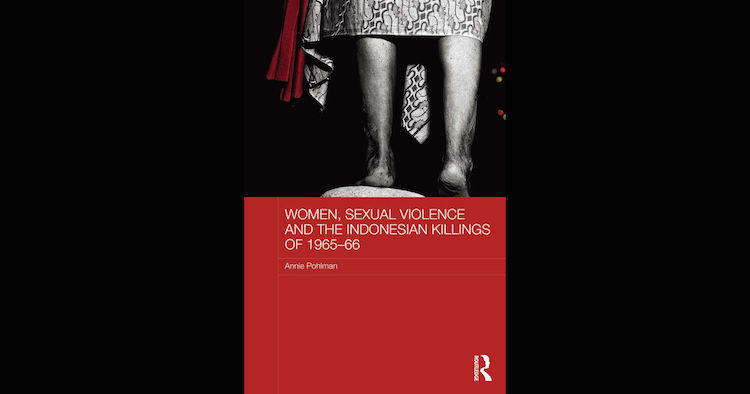Pohlman’s study provides sensitive and powerful testimony of the impact of this violence on women and girls
Hannah Loney
It’s bitter to remember, very bitter. My memories taste bitter in my mouth. But people must know what happened to us. They must know what happened.
- Ibu Lia, Jakarta, December 2005
This striking quotation opens Annie Pohlman’s highly original and fascinating book, which elegantly combines research and advocacy. The quotation is so powerful because it highlights Ibu Lia’s determination to reveal the truth about the 1965-66 mass violence in Indonesia, in which half a million alleged communists were killed. Ibu Lia was a former Indonesian Communist Party (PKI) leader and long-term political prisoner, who passed away in 2007. Pohlman dedicates the book to her memory, explaining that Ibu Lia introduced her to her friends and former colleagues, in order to fulfill her wish that ‘people must know what happened’.
The book makes a significant contribution to our understandings of the patterns in and implications of this violence. Pohlman’s use of a particular form of testimonial genre known as testimonio meant she could collect, analyse and present the testimonies of female survivors within a context of political urgency. The women were driven to testify by their personal desire to bear witness to the atrocity and to seek redress for these abuses.
In practice, this approach means that Pohlman places the women’s voices and experiences at the centre of her analysis. She interviewed around 150 survivors. Their accounts are privileged and respected within the book. Pohlman highlights commonalities across these stories, but she is also cautious not to generalise their experiences.
Pohlman’s study examines how women experienced the violence differently; in gender-specific ways and sexualised forms. Sexual enslavement, in particular, was ‘the most clearly defined and useful instrument for analysis of the testimonies and accounts’ of women’s experiences during the violence. Pohlman stresses that not all sexual violence can be defined as rape. By categorising many forms of sexual violence against women’s bodies and identities, she hopes to ‘create mechanisms for accountability for these crimes’. In this sense, the book provides a framework for exploring women’s experiences of violence in other historical contexts, including the Indonesian occupation of East Timor. Indeed, Pohlman begins to draw comparisons between the patterns of sexual violence perpetrated by the Indonesian military in East Timor and in Indonesia between 1965-66.
Another important theme is recognition of the agency of these women. This included acts of resisting, acquiescing, collaborating, negotiating and surviving during massacres and political detention. She insists that the women cannot be seen solely as victims: ‘Women made choices, devised plans and strategies to deal with these problems, and they coped with the difficult situations in which they found themselves’. There is a tendency when exploring women’s experiences of violent situations to see them as either passive victims or heroes. Pohlman seeks to challenge this dichotomy. Further, Pohlman highlights an important yet under-explored element of women’s experiences of violent conflict: those decisions that some women described as merely ‘unimportant’, ordinary and everyday (‘biasa’) in order to improve their condition or the condition of others, either emotionally or physically. As such, her study provides a nuanced contribution to broader understandings of everyday life during periods of mass violence.
Pohlman’s book ends with a comment on the ‘unfinished’ history of this period of Indonesia’s past – many of the dead have not been properly buried; the survivors are treated as second-class citizens; public acknowledgement of the harm done is absent; and reparations have not been paid. Accounts such as this book contribute to breaking the silence that surrounds the history of 1965. There is a subtle insistence that the crimes discussed demand recognition and redress, and Pohlman touches on the fact that many of the crimes perpetrated against women were in violation of international law. She admits that her initial intention was to collect, document and analyse the testimonies of female survivors of the 1965 violence. However, an explicitly political and personal objective soon also arose: ‘to present the testimonies of women survivors in order that those who hear their stories are empathetically motivated to respond, to become engaged, and to recognize their struggles to have their stories heard’.
Women, Sexual Violence and the Indonesian Killings is a valuable contribution to the literature on the 1965 violence in Indonesia. It provides an extremely important perspective on the impact of this violence on women and girls. It attends to this topic with sensitivity and dignity. It is a difficult read at times, but it is an essential one for those interested in Indonesia’s history and politics, mass violence and atrocities, and the particular experiences of women and girls. Pohlman’s book subtly, sensitively, yet persuasively demands acknowledgement of and justice for the crimes perpetrated against women and others during this violent period of Indonesia’s past.
Annie Pohlman, Women, Sexual Violence and the Indonesian Killings of 1965-66. London and New York: Routledge, 2015.
Hannah Loney (loneyh@unimelb.edu.au) is a final year PhD candidate in the School of Historical and Philosophical Studies at the University of Melbourne. Her research explores women, violence and everyday life during the Indonesian occupation of East Timor (1975-99).
Inside Indonesia 124: Apr-Jun 2016
{jcomments on}












